Why Grand Lisboa Palace Resort is the Perfect Base for Your Next Macau Adventure
Luxury finds deeper meaning at Grand Lisboa Palace Resort Macau, a sanctuary ...
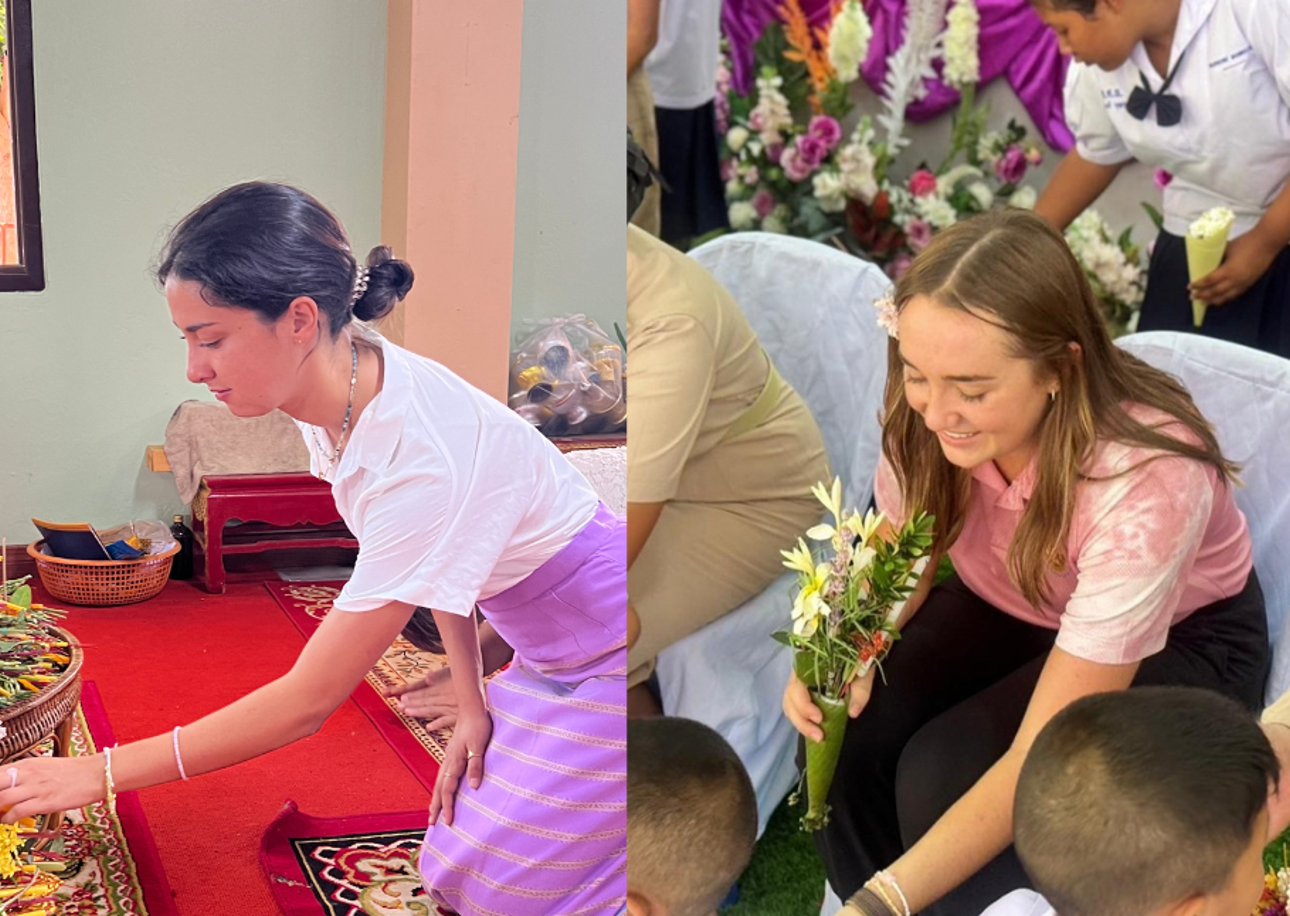
“I believe!” fifth graders chant with Maddy in Sri Satchanalai.
“I believe that we!” Corrine adds, high fiving students in Thasala.
“I believe that we will learn!”
The students repeat in unison, hands waving in the air.
1,200 miles apart, two classes of students begin their daily affirmations in the same way. The fifth graders in Sri Satch echo Teacher Taandtawan, and the fourth graders in Thasala mimic Teacher Saai Roong.
Maddy and Corrine set up speakers, laminated alphabet tiles, white board markers, index cards and fly swatters. The students settle and ready for the subsequent stretching activity included in their daily routine.
Welcome to class with Teacher Saai Roong and Teacher Taandtawan. Each week, we teach 600-700 students across an average of eighteen classes. Most rooms have 30-40 students packed tightly under whirling fans, with doors open to the chants of neighbouring classrooms paying respects to their teachers.
Maddy teaching “I Believe” Affirmations
“Please stand up,” the class leader signals.
“Goooood morning teeeacher,” the students greet together.
“Good morning class, you may sit down,” we respond.
“Thaaaank you, teeeacher” they say back.
And then, we’re off! From first to sixth grade, our daily routine includes affirming bravery, practising compassion, and rallying to a rendition of the Navy SEALs’ “I believe” pep chant. No matter the structure of the new weekly lesson, our students throw themselves in established patterns that encourage them to start thinking and speaking in English.
Our greatest wish is to foster a lively and inclusive environment conducive to productive and confident English communication. It all starts with believing.
Lessons cover practical content including ordering food at restaurants, navigating directions, and explaining symptoms at doctor’s visits. However, after eight months of trial and error, we discovered that students love learning the subjects we are most passionate about teaching.
Pictures of Teacher Saai Roong skiing through waist deep powder and Teacher Taandtawan line dancing in a cowboy hat ignites our students’ curiosity. Our favourite cross-cultural lessons revolve around world travel, Paralympics, horseback riding, scuba diving, and exploring emotions in dreams.
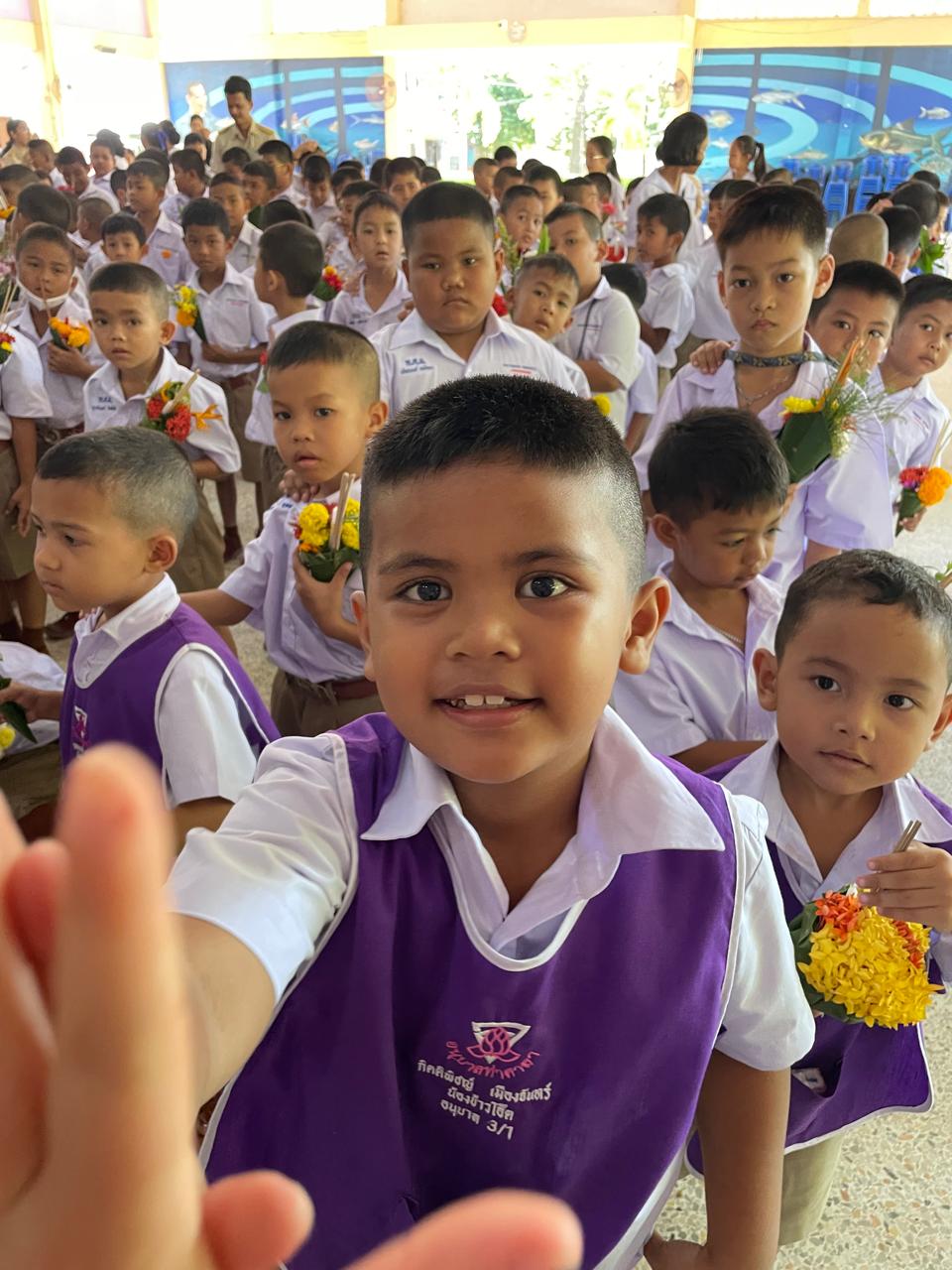
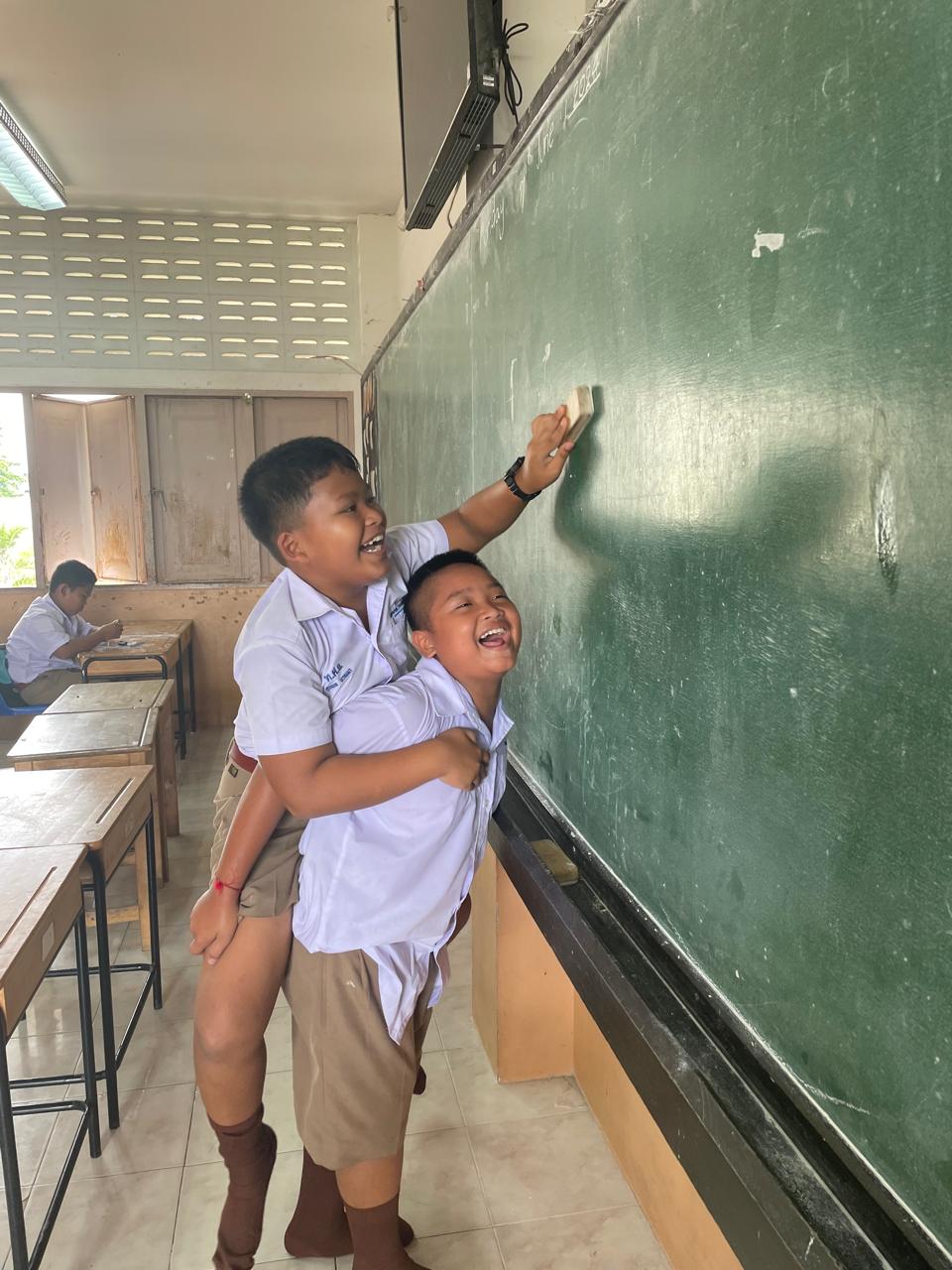
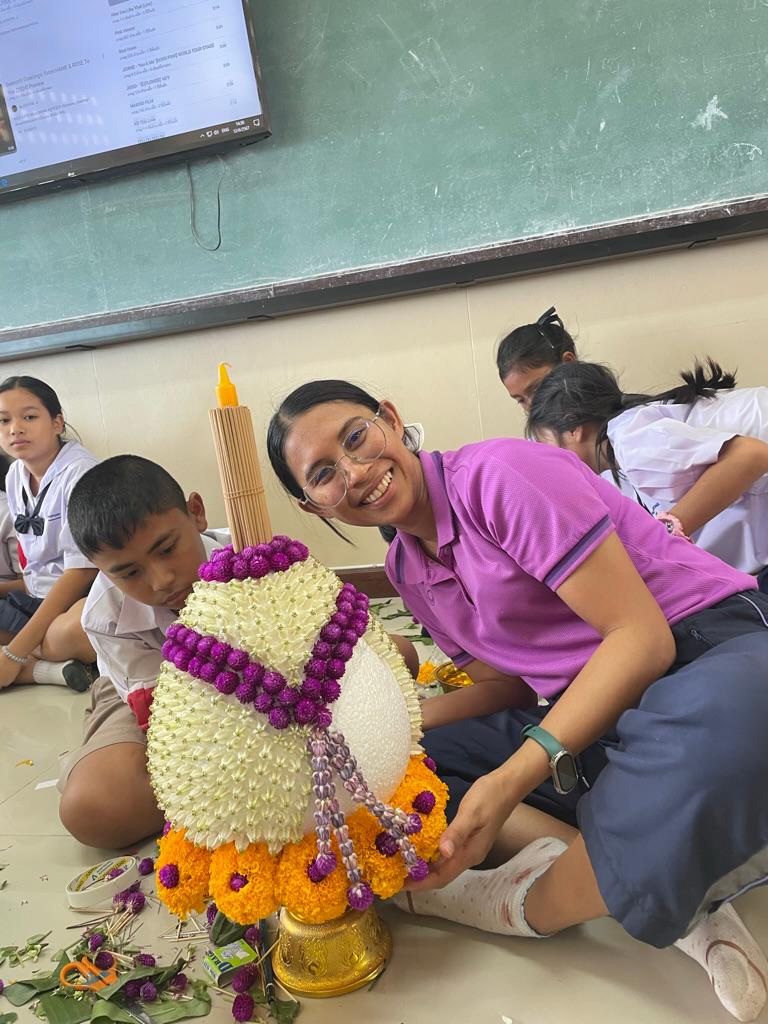
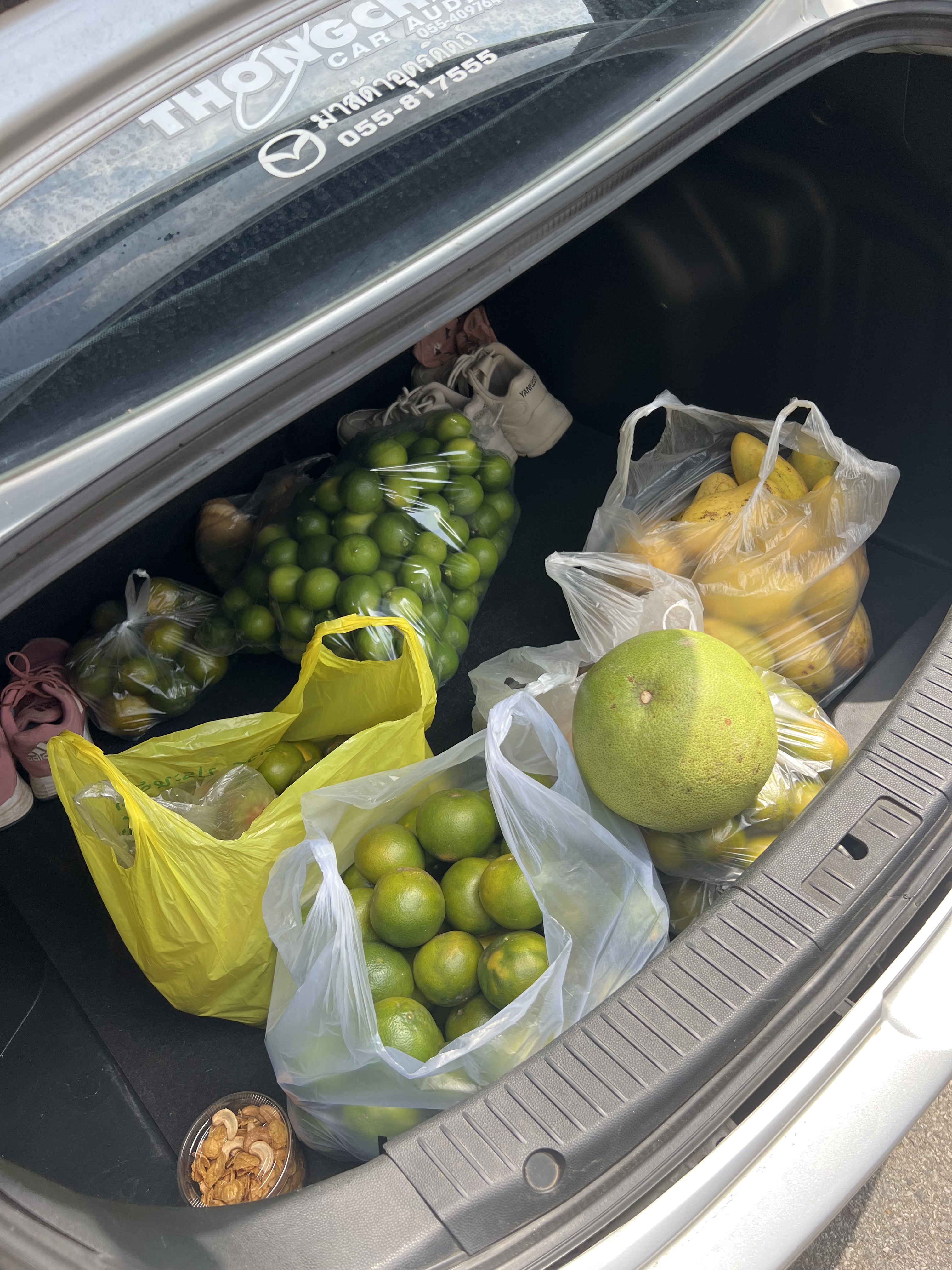
After vocabulary and TPR (total physical response) pronunciation practice, we immerse students in hands-on activities that enable cognitive engagement and cultural exchange. Our students get rowdy during race to the board spelling competitions, pass-the-ball vocabulary exercises, Labubu flashcard trivia, and phonics telephone circles. The energy is contagious. Interactive games empower even our shyest students to overcome their fears and engage in conversation.
Over the past months of teaching, our pedagogy has been tried, adjusted and reimagined. Often, it feels as if we are the students rather than the teachers. As our students learn English vocabulary, we learn Thai tones. As our co-teachers learn about American customs, we learn about Thai rituals during Wai Kru celebrations. The beauty of learning a language while immersed in its country of origin is that instead of following a textbook, our vocabulary is a reflection of interactions with our community. Thanks to the grace of our children, the acceptance of our directors, and the undying support of our Thai teachers, we confidently walk into the classroom feeling a sense of belonging.
Our host teachers are our lifelines and closest friends in our communities. They demonstrate proper etiquette at daily Buddhist prayer during morning assembly, explain how to recapture students’ attention in Thai, and remind us at every moment to eat. In class, they translate when students do not understand instruction, and after school they encourage us to practise leading chants for our upcoming sports day. Outside of school responsibilities, our host teachers look after our living arrangements, transportation needs, and show up at our door if our morning alarm does not go off.
Not only are they our coworkers, but they are our friends. After school, Maddy and her host teacher, P’Jii, can be spotted at ancient ruins for exercise after school, singing ABBA in the car, or sharing goi tiow noodles along the river. P’Jii always includes Maddy in town events, such as the Visakha Bucha Day celebration.
Before the Visakha festivities began, P’Jii knocked on Maddy’s door, “Here is a traditional Sri Satch skirt for today’s gathering. Prepare to dance. I’ll pick you up in 20 minutes!” he said, handing Maddy a beautiful, lilac sequin skirt.
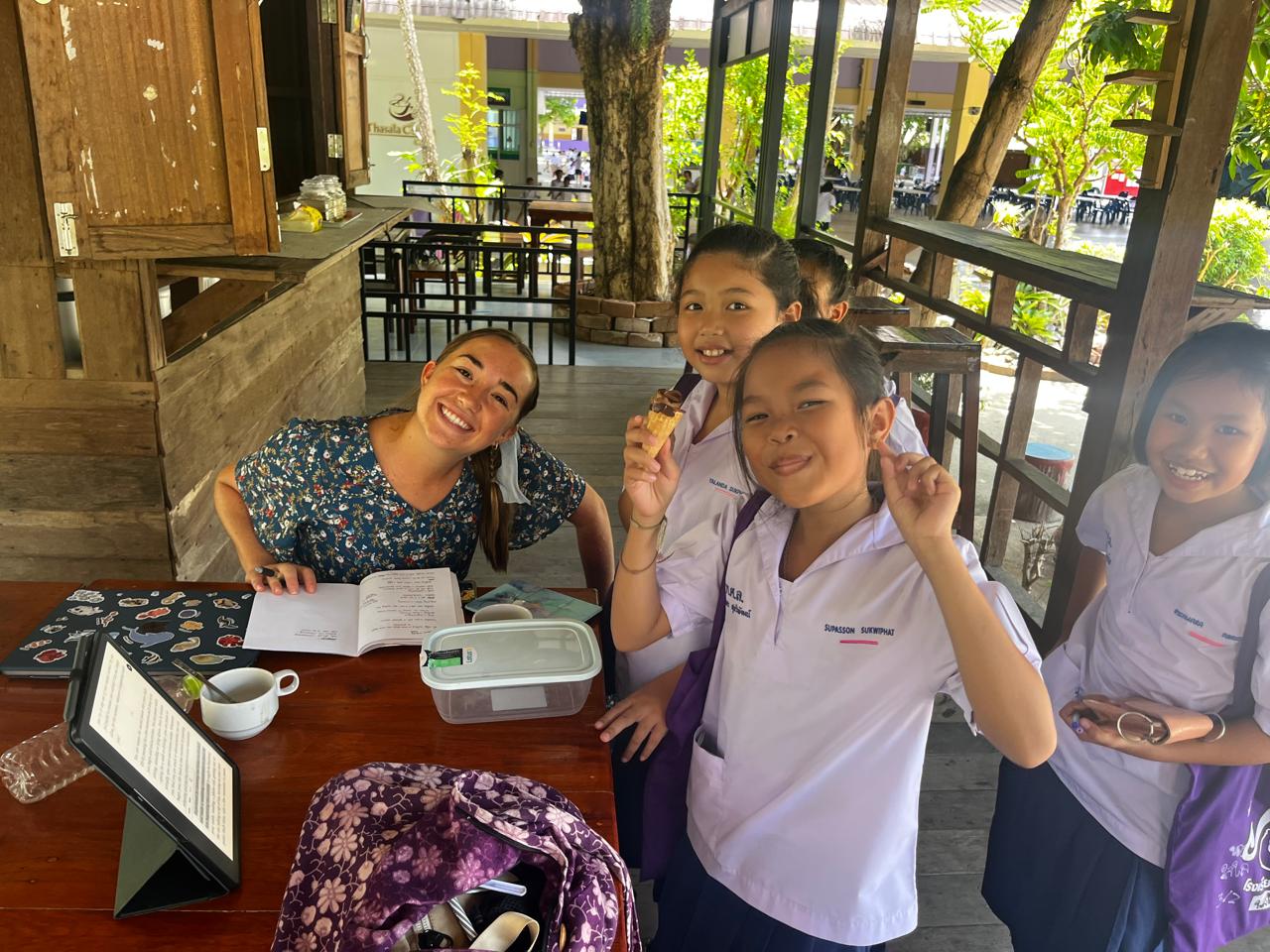
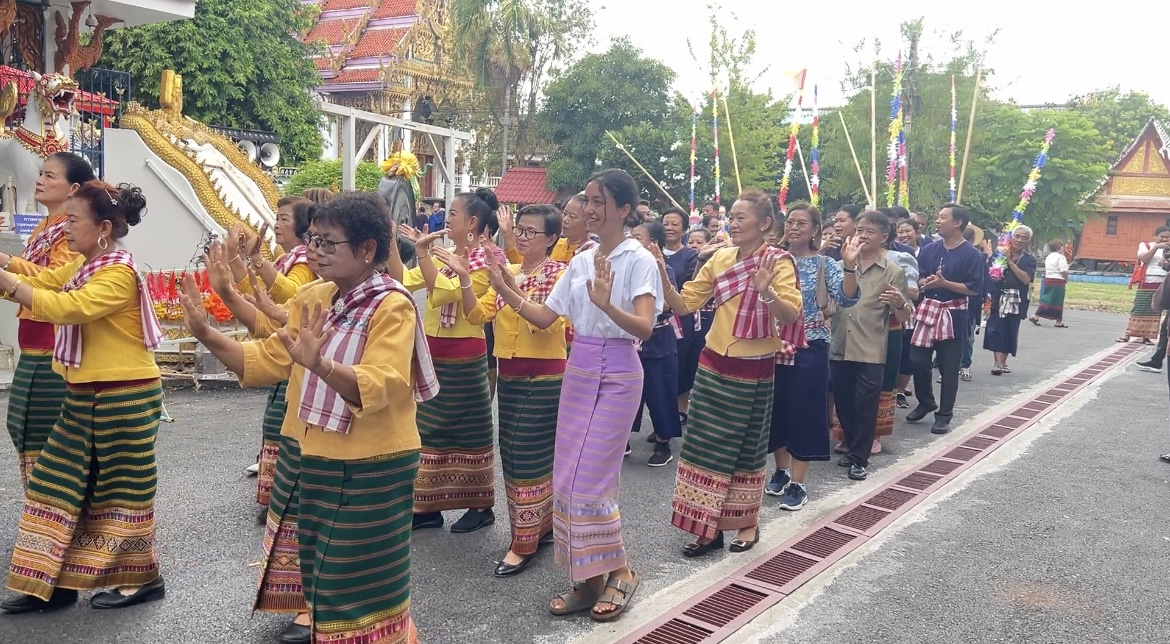
Maddy joins her Zumba ladies and community members dancing around their local temple three times as they commemorate the Buddha’s life, death and enlightenment. Throughout the day, P’Jii shares the history of the monk’s ancient worship call and response rituals, and Maddy is fed until she near pops.
P’Pun and P’Jii go out of their way to make sure we are comfortable, supported, and informed on ways to interact with our local communities. We are inspired by their commitment to their schools, generous personal camaraderie, and continuous devotion to their students that extends well beyond school hours.
Several days after school and on weekends, we accompany our host teachers on home visits, where we meet our students standing alongside their families. Similar to parent-teacher conferences in the U.S., our Thai colleagues celebrate academic success, and inquire about any behavioural concerns. However, instead of the parents coming to school, in Thailand, the teachers go to the students’ homes.
We drive through rice paddies, mango farms and palm tree fields while locating our students’ driveways. Once we arrive, we are greeted by grandma’s, grandpa’s, aunts, uncles, and siblings, who all live together under the same roof. After respectful greetings and introductions, we participate in productive conversation. We commend their children’s work habits, social manners, and classroom participation. Also, we address behavioural concerns and listen to parents’ perspectives. Most importantly, we make sure the student’s living conditions are adequate, and that they have the resources conducive to maximising their education.
Sometimes the students’ pet parrots perch on our hair, and other days small dogs jump in our laps during these conversations. Our students shriek with delight while showing us their favourite toys and introducing us to their baby brothers. Before we stand to leave, we are hastily handed endless bags of mangos, oranges, limes and mangosteens.
After the many home visits, we discuss each student’s living situation in depth with our Thai teachers.
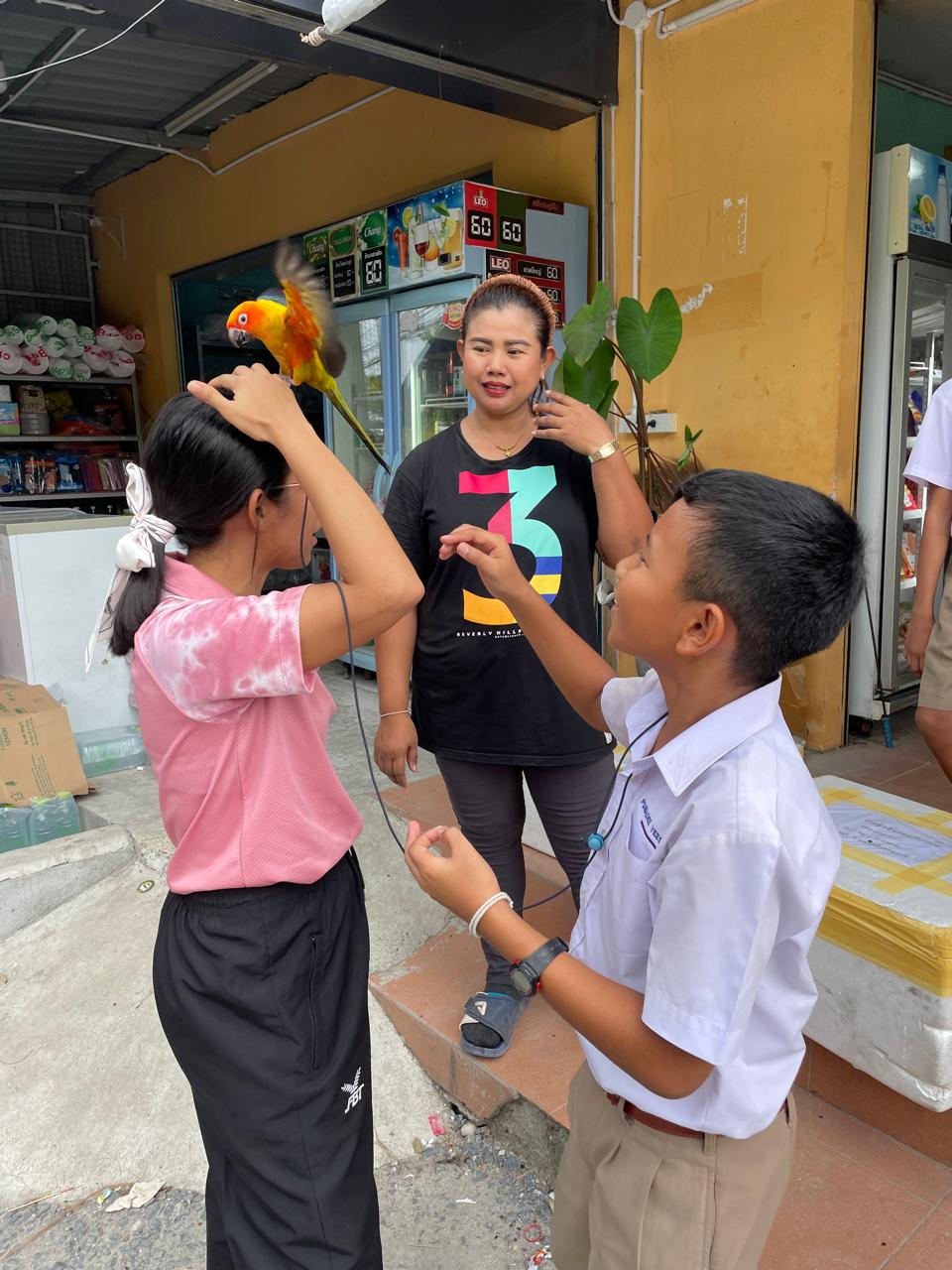
“He has no parents; his grandma raises him and his brother, alone,” P’Pun explains to Corrine as she jots down notes in her notebook.
“How is he affording school supplies?” Corrine asks.
“His grandma mentioned he had a government scholarship last year, but this year, he hasn’t been so lucky,” P’Pun sighs.
Corrine notes financial aid while simultaneously reminding P’Pun about the upcoming pothole. On the drive back home, it becomes evident that school encompasses much more than just successful sentence structure lessons.
The Thai educators are simply incredible. We are deeply thankful to collaborate with individuals whose unparalleled adaptability, resilience, and fervour for education are profoundly inspiring. They go out of their way to care for their students, and work tirelessly to ensure student’s home and school environments are suitable for personal and academic success. In response, students honour their teachers as educators, role models, and parental figures.
A few weeks ago we had the privilege to witness a special ritual in Thailand. Wai Kru or Teachers Appreciation Day is a day in which students celebrate and honour their teachers for their impact on students’ learning, and investment in their well-being. Standing next to our Thai colleagues, one by one we accepted beautiful, handmade flower bouquets from our students. We were overjoyed to witness the special bond between teachers and students. This event showcased a deep gratitude for teachers embedded in Thai culture. It was a day we’ll always remember.
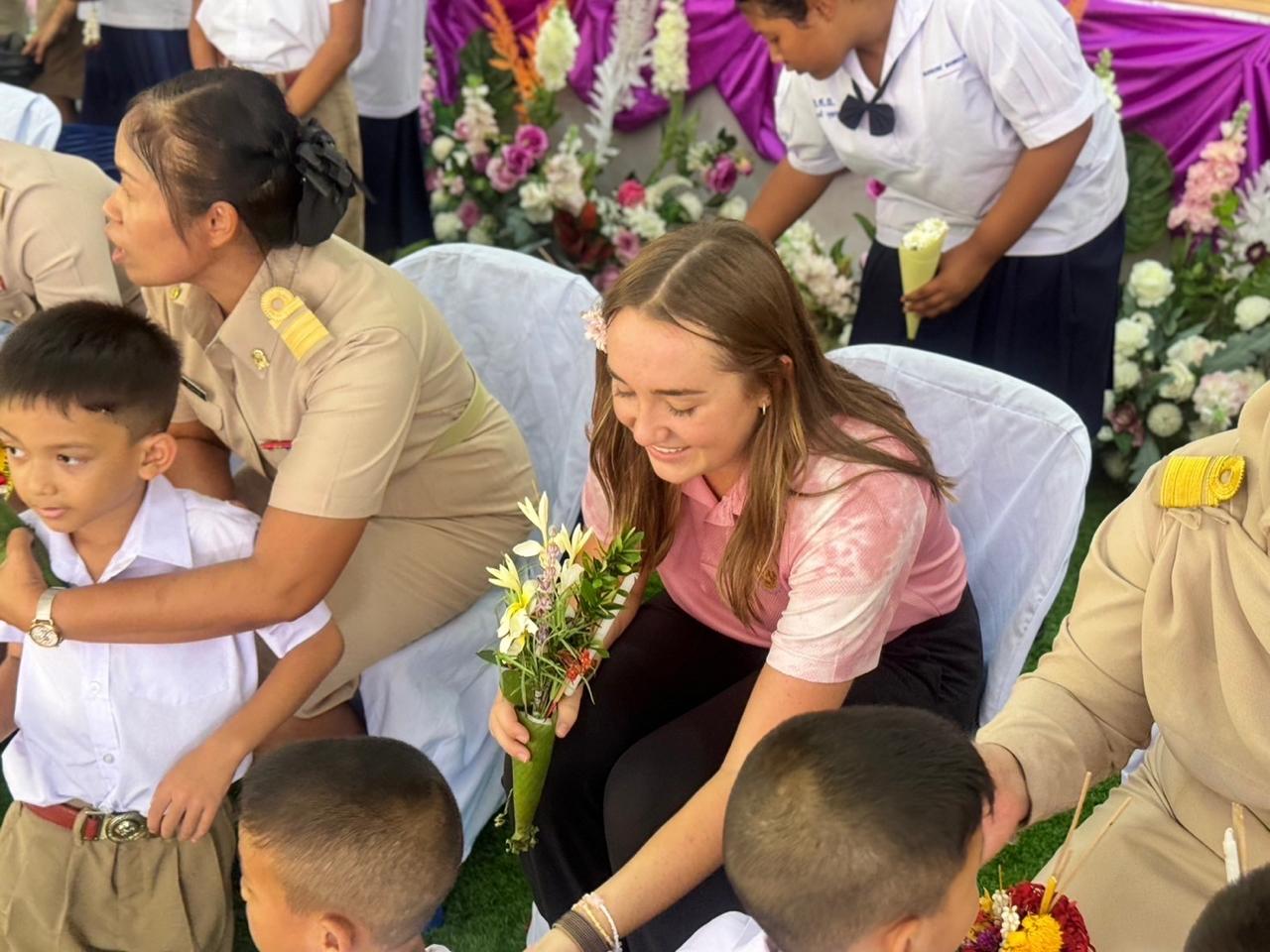
Teacher Saai Roong receiving flowers from her P’4 student on Wai Kru day.
School is home to many, and we gladly provide comfort and belonging within its walls. Living in Thailand, we realise we are just two individuals in an ecosystem of learning. We may not be perfect teachers, but we remind our students daily that we believe in them. Our teachers show us how to best serve students by assessing their progress as a whole person, and go the extra mile to check on living situations at home. Parents teach us how to care with intentionality, exercise patience, and welcome foreigners like family. Lastly, without their knowledge, our students are our greatest teachers. They show us how to stay present, practise radical generosity and love unconditionally. It is impossible to have a bad day in a second-grade classroom when you are quite literally tackled by sticker-covered, pen-stained and ice-cream dripping kids.
Through imparting our knowledge as foreign English teachers, we contribute as best we can to this cycle of education that begins and ends with generosity. We too are students constantly learning from every Thai teacher, parent, maid, director, cook, and student to give everything we can, whenever we can. So each day, we do just that: dancing until our feet ache, chanting “I believe” until our voices tire, and loving until our hearts overflow.
Being an educator is far from easy. But nothing easy is worth having.
Teachers and students, united by the transformative power of education, believe.
Payment for our columns will be directly donated to Maddy and Corrine’s schools to help towards upgrading classroom facilities, buy English games and purchase school supplies. Thank you for following us on this journey.
Luxury finds deeper meaning at Grand Lisboa Palace Resort Macau, a sanctuary ...
In this month’s feature, artists and performers share how art quietly inspires ...
Courtesy of @sailorr Sailorr and Molly Santana’s black grills fuse hip-hop swagger ...
Wandering around the globe, try out the signature tastes of cultures across ...
These top 5 barber shops in Bangkok are where gentlemen can elevate ...
Must-have gadgets for kids in the Y2K are, predictably, making a comeback ...
Wee use cookies to deliver your best experience on our website. By using our website, you consent to our cookies in accordance with our cookies policy and privacy policy